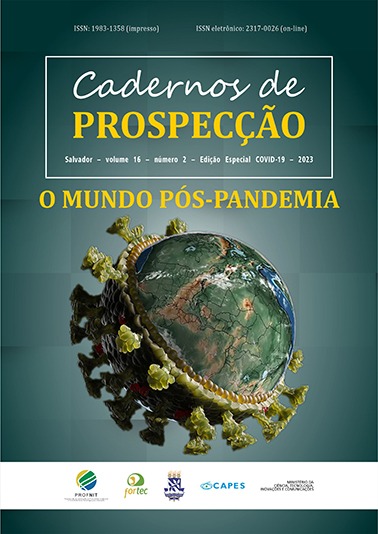Analysis of Research Projects Focusing on Artificial Intelligence and Digital Technologies to Fight COVID-19
DOI:
https://doi.org/10.9771/cp.v16i2.50578Keywords:
Covid-19, Research and Innovation, Technology.Abstract
In 2020, the World Health Organization declared that the COVID-19 pandemic become a public health emergency of international concern. Thus, investments from various countries and continents have emerged in research projects and technological innovation aimed at mitigating this global problem. This article aims to evaluate the Science, Technology and Innovation (ST&I) projects concerning solutions using Artificial Intelligence (IA) and related technology to fight COVID-19 that received funding in the period from 2020 to 2022 and were registered on the Orbit Insight platform. Regarding the institutions responsible for the projects, 50% are companies, 23% are institutes, 20% are universities, and 7% are from the United States government. Regarding the countries that have invested the most, 57.14% are funded by the European Commission and 42.86% are funded by the United States.
Downloads
References
ABD-ALRAZAQ, A. et al. Overview of technologies implemented during the first wave of the covid-19 pandemic: scoping review. Journal of Medical Internet Research, Pittsburgh, v. 23, n. 9, p. 1-18, set. 2021. Disponível em: https://www.jmir.org/2021/9/e29136. Acesso em: 19 jun. 2022.
ADADI, A.; LAHMER, M.; NASIRI, S. Artificial intelligence and covid-19: A systematic umbrella review and roads ahead. Journal of King Saud University – Computer and Information Sciences, [s.l.], Elsevier BV, p. 1-23, jul. 2021. Disponível em: https://www.sciencedirect.com/science/article/pii/S1319157821001774?via%3Dihub. Acesso em: 19 jun. 2022.
AMORIM, J. Q.; SALES, G. A. W.; GRECCO, M. C. P. Covid-19 e os impactos nas políticas de financiamento e investimento. Revista de Administração Mackenzie, São Paulo, v. 23, n. 2, p. 1-27, fev. 2022. Disponível em: http://old.scielo.br/scielo.php?script=sci_arttext&pid=S1678-69712022000200401&lng=en&nrm=iso. Acesso em: 19 jun. 2022.
ARJONA, R.; SAMSON, R. The role of research and innovation in support of europe’s recovery from the covid-19 crisis. R&I Paper Series Policy Brief, Luxembourg, p. 1-9, maio 2020. Disponível em: https://ec.europa.eu/info/sites/default/files/research_and_innovation/strategy_o. Acesso em: 21 jun. 2022.
BULLOCK, J. et al. Mapping the landscape of artificial intelligence applications against COVID-19. Journal of Artificial Intelligence Research, El Segundo, v. 69, p. 807-845, maio, 2020. Disponível em: https://www.jair.org/index.php/jair/article/view/12162. Acesso em: 21 jun. 2022.
CHANG, Z. et al. Application of artificial intelligence in covid-19 medical area: a systematic review. Journal of Thoracic Disease, [s.l.], v. 13, n. 12, p. 7.034-7.053, 2021. Disponível em: https://jtd.amegroups.com/article/view/56141/html. Acesso em: 21 jun. 2022.
DE NEGRI, F.; KOELLER, P. Políticas públicas para pesquisa e inovação em face da crise da covid-19. 2020. Disponível em: https://www.ipea.gov.br/portal/images/stories/PDFs/nota_tecnica/200520_nota_tecnica_diset_n_64.pdf. Acesso em: 20 jun. 2022.
DE NEGRI, F. et al. Ciência e tecnologia frente à pandemia: como a pesquisa científica e a inovação estão ajudando a combater o novo coronavírus no Brasil e no mundo. 2020. Disponível em: https:// www.ipea.gov.br/cts/pt/central-15 de-conteudo/artigos/artigos/182-corona. Acesso em: 05 ago. 2022.
FRY, C. et al. Consolidation in a crisis: Patterns of international collaboration in early Covid-19 research. Plos One, Estados Unidos, v. 15, n. 7, p. 1-15, jul. 2020. Disponível em: https://journals.plos.org/plosone/article?id=10.1371/journal.pone.0236307. Acesso em: 20 jun. 2022.
GOLINELLI, D. et al. Adoption of digital technologies in health care during the covid-19 pandemic: systematic review of early scientific literature. Journal of Medical Internet Research, [s.l.], v. 22, n. 11, p. 1-23, set. 2020. Disponível em: https://pubmed.ncbi.nlm.nih.gov/33079693/. Acesso em: 20 jun. 2022.
IPEA – INSTITUTO DE PESQUISA ECONÔMICA APLICADA. Países investem em pesquisa e inovação para superar a pandemia de covid-19. 2020. Disponível em: https://www.ipea.gov.br/portal/index.php?option=com_content&view=article&id=35588. Acesso em: 20 jun. 2022.
LALMUANAWMA, S.; HUSSAIN, J.; CHHAKCHHUAK, L. Applications of machine learning and artificial intelligence for Covid-19 (SARS-CoV-2) pandemic: A review. Chaos, Solitons & Fractals, [s.l.], v. 139, p. 1-6, jun. 2020. Disponível em: https://www.sciencedirect.com/science/article/pii/S0960077920304562?via%3Dihub. Acesso em: 20 jun. 2022.
LAVIN, A. et al. Technology readiness levels for machine learning systems. Nature Communications, London, n. 13, v. 6.039, p. 1-19, set. 2022. Disponível em: https://www.nature.com/articles/s41467-022-33128-9. Acesso em: 20 jun. 2022.
MATHIEU, E. et al. Coronavirus Pandemic (COVID-19). 2023. Disponível em: https://ourworldindata.org/coronavirus. Acesso em: 25 jan. 2023.
OLIVEIRA, E. A. et al. Covid-19 pandemic and the answer of science: a year in review. Anais da Academia Brasileira de Ciências, Rio de Janeiro, v. 93, n. 4, 2021. Disponível em: http://old.scielo.br/scielo.php?script=sci_arttext&pid=S0001-37652021000700702&lng=en&nrm=iso. Acesso em: 30 jun. 2022.
ROBERTS, M. et al. Common pitfalls and recommendations for using machine learning to detect and prognosticate for COVID-19 using chest radiographs and CT scans. Nature Machine Intelligence, Londres, v. 3, p. 199-217, mar. 2021. Disponível em: https://www.nature.com/articles/s42256-021-00307-0. Acesso em: 28 jan. 2023.
Downloads
Published
How to Cite
Issue
Section
License
Copyright (c) 2023 Cadernos de Prospecção

This work is licensed under a Creative Commons Attribution-NonCommercial 4.0 International License.
O autor declara que: - Todos os autores foram nomeados. - Está submetendo o manuscrito com o consentimento dos outros autores. - Caso o trabalho submetido tiver sido contratado por algum empregador, tem o consentimento do referido empregador. - Os autores estão cientes de que é condição de publicação que os manuscritos submetidos a esta revista não tenham sido publicados anteriormente e não sejam submetidos ou publicados simultaneamente em outro periódico sem prévia autorização do Conselho Editorial. - Os autores concordam que o seu artigo ou parte dele possa ser distribuído e/ou reproduzido por qualquer forma, incluindo traduções, desde que sejam citados de modo completo esta revista e os autores do manuscrito. - Revista Cadernos de Prospecção está licenciado com uma Licença Creative Commons Attribution 4.0. Esta licença permite que outros remixem, adaptem e criem a partir do seu trabalho para fins não comerciais, e embora os novos trabalhos tenham de lhe atribuir o devido crédito e não possam ser usados para fins comerciais, os usuários não têm de licenciar esses trabalhos derivados sob os mesmos termos.
Este obra está licenciado com uma Licença Creative Commons Atribuição 4.0 Internacional.





